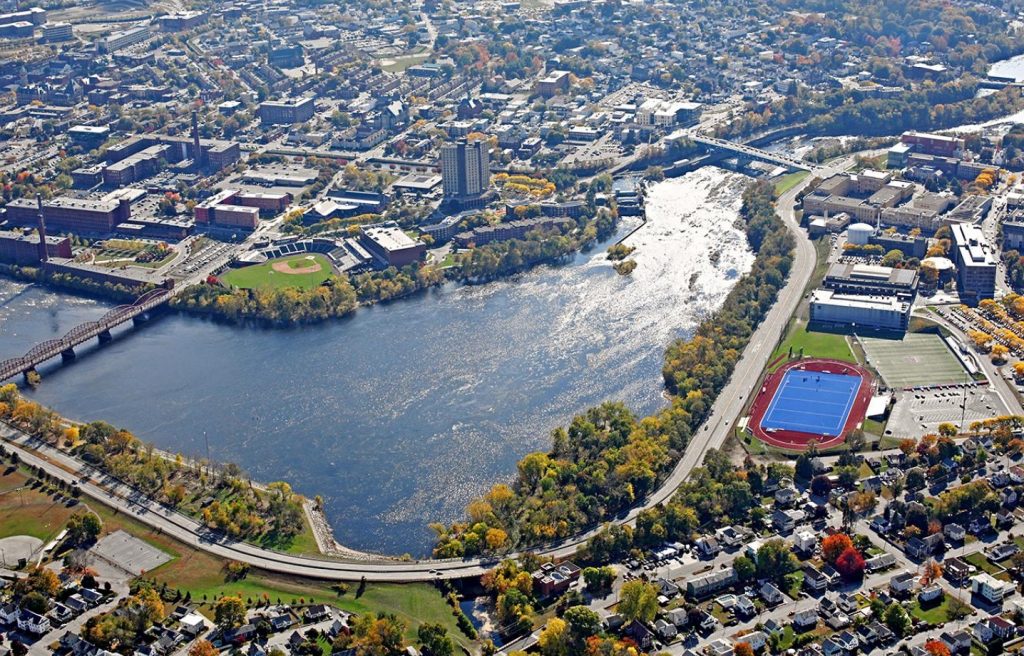Lowell – The Heart Of Ethnic Cambodia!
Written by iHeartKhmer, December 6, 2022
From being an important fishing center for Americans to being the largest and most culturally active Cambodian community on the east coast, the history of Lowell is as variant and colorful as the city is today.
It was the power and promise of the Merrimack River that led to the settlement near the Pawtucket Falls by natives, and to the formation of a new city in the 19th century. The vision of a community based on the production of textiles gave rise to the construction of a massive complex of mills, and by the 1840s, Lowell had the distinction of being the second largest city in New England and the industrial center of America. These accomplishments provided the basis for the city’s cultural and ethnic diversity, attracting immigrants from central and southern Europe initially, mostly young women farmers, who came to be known as the “mill girls.” Along came the Yankees and Irishmen, who dug Lowell’s first power canal, the Merrimack Canal. But soon due to competition, the salaries were lowered shattering their dreams of fortunes and they left, to be soon replaced by new immigrants.

It was in the 1980s that immigrants from Southeast Asia fled to the city; including Cambodians who came in large numbers as refugees, after the Khmer Rouge rule. Now, Lowell holds the second largest concentration of Cambodians in the country of Uncle Sam, with around 35,000 Cambodians living in the city. They initially settled in the “Acres” and “Highlands.” There soon came into existence businesses made just for Cambodians. Today, there are more than 100 Cambodian businesses in Lowell, with the most popular commercial areas being the “Pailin Plaza,” which hosts a restaurant, shops and a supermarket. Cambodians even built their own pagodas in Lowell.
A market to note is the Phnom Penh Market, which is the largest Asian market in Lowell. This offers the visitor a Cambodian shopping experience very different from that of a supermarket. Everything from decorative items to vegetables and fruits, from kitchen appliances to outdoor equipment is available here. How about a Cambodian newspaper?
The Cambodians imported the famous cultural events, traditions and arts of their motherland. They are a norm today and attract thousands of tourists throughout the year. The traditional South Asian Water Festival in Lowell is organized on the 3rd of August every year on the Merrimack River. This festival is hugely popular and is the ultimate must-see event for tourists visiting Lowell, with more than 60,000 people from around the world celebrating water. Crafts, foods, performances, and boat races with drummers are the highlight of this festival. The award-winning “Angkor Dance Troop” performs the classical Khmer Ballet and has earned a great reputation all over the continent.
For Cambodians a temple is as important as the air they breathe and the food they eat, if not more. The first Buddhist temple was built in the 1980s with a colorful Buddha statue and it was presided over by Monks coming to Lowell. The strong religious flavor of Cambodia can be witnessed to this day in the large new Trairatanaran Temple, which is located in the North Chelmsford.
If the Cambodian festivals, cultural events and temples leave an indelible imprint and tickle the senses, the food in Lowell impacts in such away that it leaves people craving for more. The Theptida Khmer and Red Rose are just two of the many restaurants that offer authentic Khmer cuisine; be it grilled Lok Lak, Sngou Chruok Trey or the Mee Ka-tang Rice Noodles, and a fine dining experience without having to empty the pockets. A trip to the Southeast Asian Restaurant is a must, as it is the first such restaurant of its kind to be opened in Lowell in 1985 and their menu is diverse, concentrating on Cambodia, Thai and Chinese cuisines. The aromas wafting through their kitchens are sure to drag you in.
The famous Clemente Park on Middlesex Street, a major tourist attraction, proves that parks are not only for children. Built in the 1970s, this park is a social hub for Cambodians, and a wonderful place to taste great home-made Cambodian eats, such as papaya and mango salad, teriyaki, beefsteak and a host of other foods. There is also a stone chess table for chess lovers and it is frequented by Cambodians of all age-groups.
An event that cannot be missed falls on the last weekend in July of every year; when the downtown streets in Lowell are shut down to celebrate the cultural diversity with guests from around the world. A smorgasbord of music, dance, art, ethnic food and other activities make this festival exciting, with thousands of people out on the streets. Music enthusiasts can even enjoy the Lowell Folk Festival, which is more of a jazz, country, ska and mariachi music festival held on warn July nights.
Lowell is a beautiful place to be and a visit to the Museum can help tourists understand the immigrant’s path of struggle leading to success. If textiles tickle your fancy, the American Textile History Museum and the New England Quilt Museum offer a glimpse into the evolution of art, and not to forget the Revolving Museum that holds colorful reminders of the 1960s, and is a major attraction of downtown. If not, then a two-hour tour of the city on a boat, trolley or by foot conducted by the Lowell National Historical Park, can give a peek into the extremely enchanting charm of this beautiful city.
With all these flavors of Cambodia in Lowell, a visit to this city gives an in-depth understanding of the centuries-old Cambodian culture, leaving visitors mesmerized.

Discuss about: Lowell – The Heart Of Ethnic Cambodia!
You must be logged in to post a comment.